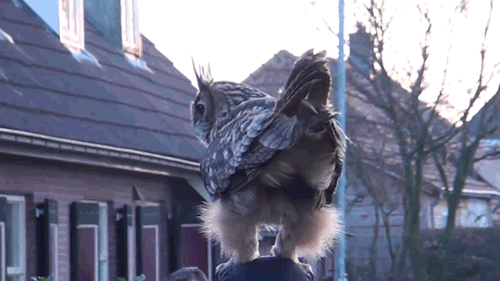Ourvioletdeath - Inner Ramblings Of The Mind

More Posts from Ourvioletdeath and Others

It happens all too often, especially among people on the autism spectrum, to argue for really stupid things.
Psychologists and child development specialists have also come up with ways to support shy kids. The key, said Sandee McClowry, a psychologist at New York University, is to nudge children out of their comfort zones without trying to change their fundamental natures.




Dutch “Cuddly Owl” finally caught on video. This bird has been cuddling the citizens of this town for a while. It likes to land and stomp on people’s heads.
Watch the video
You’re a fledgling hero who has just found yourself a talking magical sword. She’s got no real combat experience either, but she does have a lot of moxie and is incredibly pleased to finally have a wielder.
Your grandmother bequeaths a statue of an angel to you in her will. You find it creepy, but not having the heart to sell it, you store it in the basement. The next morning, to your horror, the basement door is wide open, and there is a note lying where you left the statue. Picking it up, you barely make out the scrawled words. “Find me before I find you.”

(Image caption: Two Aplysia sensory neurons with synaptic contacts on the same motor neuron in culture after isolation from the nervous system of Aplysia. The motor neuron has been injected with a fluorescent molecule that blocks the activity of a specific Protein Kinase M molecule. Credit: Schacher Lab/Columbia University Medical Center)
Select Memories Can Be Erased, Leaving Others Intact
Different types of memories stored in the same neuron of the marine snail Aplysia can be selectively erased, according to a new study by researchers at Columbia University Medical Center (CUMC) and McGill University and published in Current Biology.
The findings suggest that it may be possible to develop drugs to delete memories that trigger anxiety and post-traumatic stress disorder (PTSD) without affecting other important memories of past events.
During emotional or traumatic events, multiple memories can become encoded, including memories of any incidental information that is present when the event occurs. In the case of a traumatic experience, the incidental, or neutral, information can trigger anxiety attacks long after the event has occurred, say the researchers.
“The example I like to give is, if you are walking in a high-crime area and you take a shortcut through a dark alley and get mugged, and then you happen to see a mailbox nearby, you might get really nervous when you want to mail something later on,” says Samuel Schacher, PhD, a professor of neuroscience in the Department of Psychiatry at CUMC and co-author of the paper. In the example, fear of dark alleys is an associative memory that provides important information—e.g., fear of dark alleys—based on a previous experience. Fear of mailboxes, however, is an incidental, non-associative memory that is not directly related to the traumatic event.
“One focus of our current research is to develop strategies to eliminate problematic non-associative memories that may become stamped on the brain during a traumatic experience without harming associative memories, which can help people make informed decisions in the future—like not taking shortcuts through dark alleys in high-crime areas,” Dr. Schacher adds.
Brains create long-term memories, in part, by increasing the strength of connections between neurons and maintaining those connections over time. Previous research suggested that increases in synaptic strength in creating associative and non-associative memories share common properties. This suggests that selectively eliminating non-associative synaptic memories would be impossible, because for any one neuron, a single mechanism would be responsible for maintaining all forms of synaptic memories.
The new study tested that hypothesis by stimulating two sensory neurons connected to a single motor neuron of the marine snail Aplysia; one sensory neuron was stimulated to induce an associative memory and the other to induce a non-associative memory.
By measuring the strength of each connection, the researchers found that the increase in the strength of each connection produced by the different stimuli was maintained by a different form of a Protein Kinase M (PKM) molecule (PKM Apl III for associative synaptic memory and PKM Apl I for non-associative). They found that each memory could be erased – without affecting the other — by blocking one of the PKM molecules.
In addition, they found that specific synaptic memories may also be erased by blocking the function of distinct variants of other molecules that either help produce PKMs or protect them from breaking down.
The researchers say that their results could be useful in understanding human memory because vertebrates have similar versions of the Aplysia PKM proteins that participate in the formation of long-term memories. In addition, the PKM-protecting protein KIBRA is expressed in humans, and mutations of this gene produce intellectual disability.
“Memory erasure has the potential to alleviate PTSD and anxiety disorders by removing the non-associative memory that causes the maladaptive physiological response,” says Jiangyuan Hu, PhD, an associate research scientist in the Department of Psychiatry at CUMC and co-author of the paper. “By isolating the exact molecules that maintain non-associative memory, we may be able to develop drugs that can treat anxiety without affecting the patient’s normal memory of past events.”
“Our study is a ‘proof of principle’ that presents an opportunity for developing strategies and perhaps therapies to address anxiety,” said Dr. Schacher. “For example, because memories are still likely to change immediately after recollection, a therapist may help to ‘rewrite’ a non-associative memory by administering a drug that inhibits the maintenance of non-associative memory.”
Future studies in preclinical models are needed to better understand how PKMs are produced and localized at the synapse before researchers can determine which drugs may weaken non-associative memories.

Little vases
Your MC knows they’re in a story, and makes full use of all the tropes to come out a hero every time. Trouble is, there’s a real hero emerging in the city, which presents the MC with a choice: remain a hero and watch the story crumble around them, or become a villain and save the world
😂😂

I love the quotation marks.
Net Neutrality
-
 kawaiidesu liked this · 2 weeks ago
kawaiidesu liked this · 2 weeks ago -
 mlithium2 liked this · 2 weeks ago
mlithium2 liked this · 2 weeks ago -
 fetchr7 liked this · 2 weeks ago
fetchr7 liked this · 2 weeks ago -
 esquizo3214378 reblogged this · 2 weeks ago
esquizo3214378 reblogged this · 2 weeks ago -
 esquizo3214378 liked this · 2 weeks ago
esquizo3214378 liked this · 2 weeks ago -
 nagasarennayoex reblogged this · 2 weeks ago
nagasarennayoex reblogged this · 2 weeks ago -
 nagasarennayoex liked this · 2 weeks ago
nagasarennayoex liked this · 2 weeks ago -
 theoldtentacledgods liked this · 2 weeks ago
theoldtentacledgods liked this · 2 weeks ago -
 kamaitachi-hime666 liked this · 2 weeks ago
kamaitachi-hime666 liked this · 2 weeks ago -
 oluwatitobiju reblogged this · 2 weeks ago
oluwatitobiju reblogged this · 2 weeks ago -
 titobiju liked this · 2 weeks ago
titobiju liked this · 2 weeks ago -
 kawaiidesu reblogged this · 2 weeks ago
kawaiidesu reblogged this · 2 weeks ago -
 lapoudredanslesyeux liked this · 2 weeks ago
lapoudredanslesyeux liked this · 2 weeks ago -
 burac46 reblogged this · 2 weeks ago
burac46 reblogged this · 2 weeks ago -
 burac46 liked this · 2 weeks ago
burac46 liked this · 2 weeks ago -
 a7-27 liked this · 3 weeks ago
a7-27 liked this · 3 weeks ago -
 xxdestinyschildxx reblogged this · 4 weeks ago
xxdestinyschildxx reblogged this · 4 weeks ago -
 oakleyhitler-blog liked this · 1 month ago
oakleyhitler-blog liked this · 1 month ago -
 thejessica reblogged this · 1 month ago
thejessica reblogged this · 1 month ago -
 joycolorcups liked this · 1 month ago
joycolorcups liked this · 1 month ago -
 look-onmyworks liked this · 1 month ago
look-onmyworks liked this · 1 month ago -
 fuckravesleeprepeat reblogged this · 1 month ago
fuckravesleeprepeat reblogged this · 1 month ago -
 fuckravesleeprepeat liked this · 1 month ago
fuckravesleeprepeat liked this · 1 month ago -
 darkroom69 reblogged this · 1 month ago
darkroom69 reblogged this · 1 month ago -
 darkroom69 liked this · 1 month ago
darkroom69 liked this · 1 month ago -
 arlecchinoxxx liked this · 1 month ago
arlecchinoxxx liked this · 1 month ago -
 scrollsomemo reblogged this · 1 month ago
scrollsomemo reblogged this · 1 month ago -
 papilioregalis liked this · 1 month ago
papilioregalis liked this · 1 month ago -
 colourfulheartbeats reblogged this · 1 month ago
colourfulheartbeats reblogged this · 1 month ago -
 auroraborealis-things liked this · 1 month ago
auroraborealis-things liked this · 1 month ago -
 mercedesgasly33 liked this · 1 month ago
mercedesgasly33 liked this · 1 month ago -
 tinytysh liked this · 1 month ago
tinytysh liked this · 1 month ago -
 atlaskeira reblogged this · 1 month ago
atlaskeira reblogged this · 1 month ago -
 atlaskeira liked this · 1 month ago
atlaskeira liked this · 1 month ago -
 sqgworld reblogged this · 1 month ago
sqgworld reblogged this · 1 month ago -
 sqgworld liked this · 1 month ago
sqgworld liked this · 1 month ago -
 dark-sierra reblogged this · 1 month ago
dark-sierra reblogged this · 1 month ago -
 intimissie liked this · 1 month ago
intimissie liked this · 1 month ago -
 pretty-thxg liked this · 1 month ago
pretty-thxg liked this · 1 month ago -
 kelamkafi reblogged this · 1 month ago
kelamkafi reblogged this · 1 month ago -
 kocyigitcag liked this · 1 month ago
kocyigitcag liked this · 1 month ago -
 shifty2be reblogged this · 1 month ago
shifty2be reblogged this · 1 month ago -
 willy748 liked this · 1 month ago
willy748 liked this · 1 month ago -
 05h5 liked this · 1 month ago
05h5 liked this · 1 month ago -
 daddylucky liked this · 1 month ago
daddylucky liked this · 1 month ago -
 olvckisntit liked this · 1 month ago
olvckisntit liked this · 1 month ago -
 melted-gelat0 reblogged this · 1 month ago
melted-gelat0 reblogged this · 1 month ago